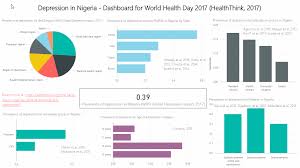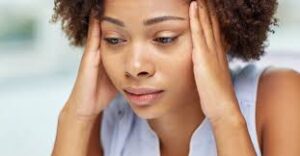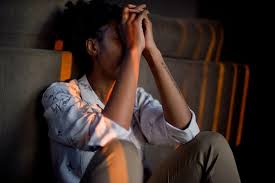Statistics have shown that 44.5% of people living in Nigeria are depressed. In this article, we will be describing what depression feels like, and how to deal with it.

Analysis
Globally, 322 million people are suffering from depression, a common mental disorder that presents with depressed mood, loss of interest or pleasure, decreased energy, feelings of guilt or low self-worth, disturbed sleep or appetite, and poor concentration. It also leads to impairment of an individuals’ ability to function and carry out everyday tasks and responsibilities, and could lead to suicide.
Omo your ringing tone no wan comot for my head(Xtra cool) by young jonn, lyrics, Mp3 download
How depression feels
To be diagnosed with major depressive disorder, you must experience at least five depression symptoms, once a day, for at least two weeks. Symptoms include being less interested in most activities you once enjoyed, feeling worthless or guilty (often about things that wouldn’t normally make you feel that way), feeling unusually tired and lacking energy, and more.
How long your depression lasts depends on lifestyle factors and whether or not you receive prompt treatment. Also, It can last for several weeks, months, or years.
The length of an episode can vary. While some people have only one, most people with depression have recurrent episodes throughout their lifetimes, which is why treatment is so important.
Left untreated, like any illness, the symptoms can get progressively worse and lead to significant impairment, interfere with relationships and job, or lead to self-harm or suicide.
Will depression ever go away?

Depression
There’s always a solution to mental health issues. Unfortunately, depression doesn’t entirely go away. There are ways to help curb the situation, and build a more positive mental health. Treatments include medication, psychotherapy, hospitalization, or electroconvulsive therapy.
Where depression comes from
Depression comes as a result of various factors. Some of them are;
- specific symptoms a person has
- having another psychiatric condition (comorbidity)
- family history of depression
- personality
- cognitive patterns
- stressful life events
- past trauma Trusted Source
- lack of social support
My Sweetie by Flavour, lyrics, video, Mp3 download
How to deal with depression
According to healthline, There are various kinds of antidepressants, and sometimes what works for one person doesn’t work for another. It’s not uncommon to have to try more than one medication to find the one that works best for you, as well.
Antidepressants can include:
selective serotonin reuptake inhibitors (SSRIs)
serotonin-norepinephrine reuptake inhibitors (SNRIs)
tricyclic antidepressants (TCAs)
atypical antidepressants
monoamine oxidase inhibitors (MAOIs)
Another means of curbing depression is through Psychotherapy.
Psychotherapy, or therapy, generally refers to “talk therapy” with a therapist.
Many people see a therapist for a variety of reasons, whether or not they have depression. It can be helpful to talk about issues arising in your life with a person who is a trained mental health professional.
There are different kinds of psychotherapy, including dialectical behavior therapy (DBT) and cognitive behavioral therapy (CBT).
Therapy can help you:
identify “triggers” that cause feelings of depression
identify detrimental beliefs that you hold
create new, positive beliefs
provide you with coping strategies for negative events and feelings
Psychotherapy is tailored to each person, and by talking about your goals and expectations with your therapist, they’ll be able to work with you to help you deal with your depression.
Electroconvulsive therapy
Electroconvulsive therapy (ECT) isn’t widely used, and it’s not right for everyone. However, it can be effective in treatment-resistant, recurrent severe depression.
The treatment consists of the use of an electrical current to stimulate a seizure while an individual is under general anesthesia.
It’s often used when other treatments haven’t been effective. It isn’t used as a first-line treatment, since it does have some significant side effects like memory loss.




2 thoughts on “What depression feels like and how to deal with it”